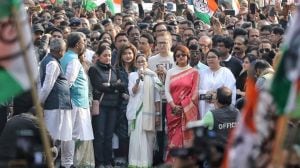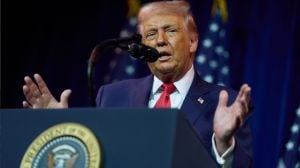Clinton wants chill to thaw: Talbott
WASHINGTON, Jan 28: In the clearest sign yet that Washington has overcome its anger and recrimination at India's May 1998 nuclear tests a...

WASHINGTON, Jan 28: In the clearest sign yet that Washington has overcome its anger and recrimination at India8217;s May 1998 nuclear tests and is ready to begin a new chapter in its ties with New Delhi, US Deputy Secretary Strobe Talbott said here on Wednesday that he sees a resolution to the sanctions issue in consonance with a more harmonious relationship the two sides hope to achieve in the near term.
In an exclusive interview with The Indian Express just hours before he left here for the eighth round of talks with his Indian interlocutors in New Delhi, Talbott said he sensed a high degree of political will in the correspondence between President Clinton and Prime Minister Vajpayee and he felt the sanctions problem 8220;is soluble.8221;
President Clinton, he said, has set as one of the objectives of his second term to have a qualitatively better relationship, 8220;and he has not given up by any means.8221; 8220;I have heard President Clinton on this subject more times than I can count before the May nucleartests and since then,8221; Talbott disclosed, providing a rare insight into the current thinking at the highest levels of the administration.
The hour-long interview took place in Talbott8217;s office on the State Department8217;s plush seventh floor, where amid classic paintings and fine carpets, the Deputy Secretary who is acting Secretary of State these days because Albright is travelling works out of a cluttered room redolent of his days as a journalist.
Several books on India, including India8217;s foreign minister Jaswant Singh8217;s Defending India, lay scattered on the coffee table. In one corner were oversized cutout maps of the troubled areas Talbott is currently dealing with: former Soviet Republics, Central Asia, Kosovo, and now, South Asia.
A man of formidable intellectual comportment, Talbott spoke at length, but very precisely, about the difficulties and complexities that have bedeviled Indo-US ties, choosing his words carefully, and often going off-the-record to freely elucidate about sensitive issues.He gave the impression that the US had come to understand India8217;s security paradigms, even if it did not agree with all the parameters.
But foremost, he indicated clearly that the momentum for normalising ties and improving the atmospherics was coming from President Clinton himself.Asked what evoked the President8217;s interest in India, Talbott, who was a fellow Rhodes scholar with Clinton in the sixties, surmised that it was great deal of British diplomatic history he Clinton read at Oxford, some of it dealing with India. They also had a couple of voluble classmates from India, he added with a chuckle.
More recently, Talbott said, the President has remarked at least half a dozen times about India8217;s large middle class and its technological prowess.8220;I remember him saying it was a shame that we have to focus on this nuclear program, when we ought to be focused on the Y2K problem, because he is aware there is a great deal of Indian expertise and entrepreneurship in the software area,8221; he added.
Withoutgoing into the fine print of the dialogue currently underway between the two sides, Talbott said he and his Indian counterpart Jaswant Singh were 8220;in one sense engaged in classic diplomacy practice of the art of possible.8221;
8220;It is based on a realistic hope that within the bounds of the possible we could have a qualitative improvement of relationship in the relatively near term. And to have this, we will have to get beyond sanctions,8221; he said.
Talbott declined to go into details or be more specific, saying it would not be healthy or helpful for the US and India to be trading positions or appearing to negotiate in public 8220;because it will have a deleterious effect on our ability to have a quiet discussion and move forward.8221;
But he said Singh and he would be talking about the subject over the next couple of days. At no stage did he suggest that the easing or lifting of sanctions would be unilateral.
The eighth rounds of talks begins Friday.
While not suggesting that the dialogue was anywhere nearclosure, Talbott did indicate that it had reached a crucial stage and the two sides were striving to reach common ground despite irreconcilable differences on the Nuclear Non-proliferation Treaty NPT, a pact that limits the world8217;s nuclear powers, and the benefits thereof, to five powers.
8220;That disagreement on NPT is going to impose some limits on this new relationship that we hope to have8230; but we still have a new relationship if we succeed in the very feasible terms and parameters that we have set for ourselves. I think it is doable in a time frame that will seem relevant and make all the hard work seem worthwhile,8221; Talbott said.
- 01
- 02
- 03
- 04
- 05































